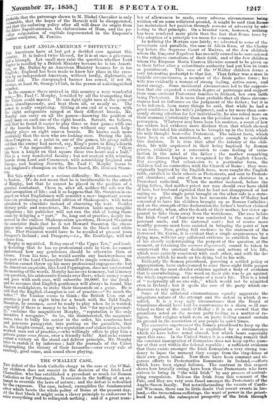THE LAST ANGLO-AMERICAN "DIFFICULTY.”
pes Americans have at last got a decided case against this country. It is indeed twice blessed, for it is at once a grievance and a triumph. Let small men raise the question whether Lord sapier is recalled by .a British Ministry because he is too Ameri- can, or Mr. Dallas by an American Ministry because he is too English; England has been made to know her place in the crea- tion by an independent American, without lordly, diplomatic, or Utecial aid. The starspangled banner has cowed, if not St. tleorge, at least St. George's Club, in the person of a distinguished member. In the summer there arrived in this country a very wonderful 1nan,—Mx. Paul C. Morphy, heralded by all the trumpeting that the Union could muster. He can fight eight men at the game of chess, simultaneously, and beat them all, or nearly so. The power is really surprising. Sitting at one end of a room, with the eight antagonists ranged at their different boards, Mr. 3forphy can carry on all the games—knowing the position of every man on each one of the eight boards. Sarratt, we believe, said that he found it easier to play three or four games with one of the boards before him, than two without any such help : Morphy plays on eight unseen boards. He knows each more accurately than the men who are looking over. During, the late Chess Congress, at a point in one of the games, his proxy called out that the enejny had moved, say, King's pawn to King's fourth square : "An impossible move ; ' exclaimed Morphy ; "there has been a knight on that square these two hours and a half." This is a very wonderful faculty ; but not content with winning laurels from Lord and Commoner, with astonishing England and Europe, and beating Harwitz, Mr. Paul C. Morphy burns to beat England's champion on the Chess board, Mr. Howard Staun-
ton. — .
But ri4es rather a serious difficulty : Mr. Staunton can't be beaten. rige do not mean that he is invulnerable to the attack of Morphy, 'but that he cannot be placed in the position of a genuine combatant. Chess is, after all, neither the sole nor the chief occupation of life ; and it so happens that Mr. Staunton is en- gaged on what Englishmen will consider a more important avoca- tion—in producing a standard edition of Shakespeare, with notes calculated to elucidate instead of obscuring the text. Besides literary pride and conscience, Mr. Staunton holds more tangible obligations : his publisher will not run the risk of losing thou- sands by delaying a "part." So, long out of practice, deeply im- mersed in the endless Shakespearian questions, Howard Staunton the annotator finds that he is not Howard Staunton the chess- player who originally earned his fame in the black and white lists. That Staunton would have to be recalled at present from Prospero's Ireland ; and Prospero,—i.e., Mr. Routledge, will not release him.
Morphy is mystified. Being one of "the Upper Ten," and loud- ly declarine° that he has no professional ends in view, he cannot understand how any gentleman should be otherwise than at leisure. From his tone, he would ascribe any backwardness on the part of the Lord Chancellor himself to simple cowardice. Mr. Staunton cannot throw up his more professional engagements : but the American exquisite, like Lord Foppington, does not understand the meaning of the words. Morphy has no eye to money, but if money isin question, his aristocratic friends over there, where money comes and goes with such ease, will subscribe 10,000/. for the freak : and he assumes that English gentlemen will always be found, like Eastern cockfighters, to stake their thousands on a game. He is told that the English champion is out of practice—" So much the better !" the Yankee seems to think ; the British Lion out of Practice is just in right trim for a brush with the Bald Eagle. Staunton, he assumes, must be ready to play when he is wanted, especially if there is money to be lost; but "for myself personal- ly," exclaims the magnificent Morphy, "reputation is the only incentive I recognize." So he, the disinterested, the magnani- mous, tries to bully his senior in the order, his courteous host and generous panegyrist, into putting on the gauntlets, that he, the knight-errant, may win reputation and stakes from a hard- 'worked man out of practice,—who willingly offers to play him a Private game sans fa9on, over a friendly table! And as he cannot extort a victory on the stand and deliver principle, Mr. Morphy tries !es to snatch it by inference ; half the journals of the Union Telegraphing the victory of their favourite—over every rule of Courtesy, good sense, and sound chess playing.


























 Previous page
Previous page